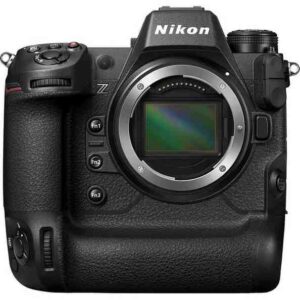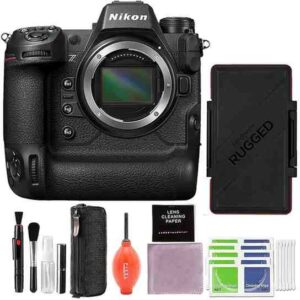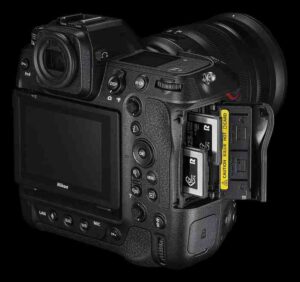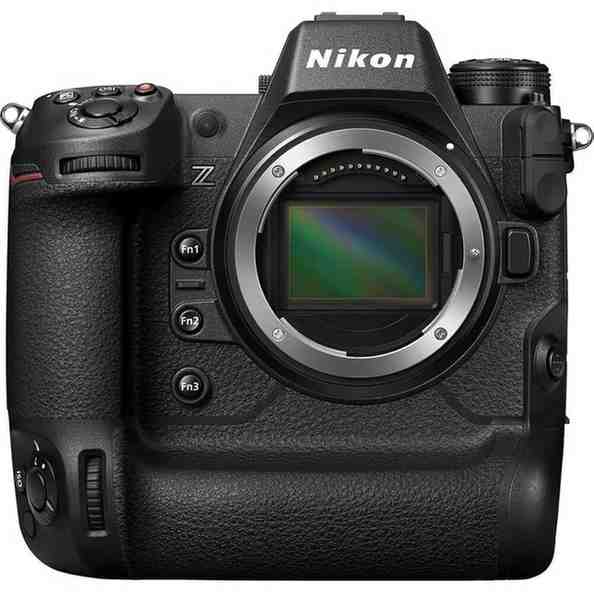Have you been wondering if the Nikon Z9 is still the best mirrorless camera in 2025? When Nikon released it, the Z9 was seen as a bold statement—built for professionals who demanded speed, reliability, and cutting-edge video power. But now that competitors like the Sony A1 and Canon R3 have matured, photographers want to know if the Z9 still holds its ground.
In this Nikon Z9 review, I’ll share not just the specs, but my real-world experience with the camera. I’ll cover how it performs in demanding conditions, compare it against rivals, and point out the details that actually matter when you’re out shooting. Whether you’re a sports photographer, wedding shooter, or hybrid creator, this review will help you decide if the Z9 is the right investment for your work.
Table of Contents
Table of Contents
- First Impressions: Unboxing the Z9
- Build Quality & Design
- Image Quality & Performance
- Autofocus System
- Video Capabilities
- Battery Life
- Pros & Cons
- Who Should Buy This Camera
- Final Verdict & Score
First Impressions: Unboxing the Z9
When I first held the Nikon Z9 Flagship Professional Camera, I immediately knew this wasn’t just another camera – it was a statement. After years of waiting for Nikon to answer Canon and Sony’s flagship offerings, the Z9 finally arrived, and I can honestly say it exceeded my expectations in ways I never anticipated.

The first thing that struck me was the solid, professional build quality. Unlike the lighter Z6 and Z7 series, the Z9 feels substantial in your hands – the kind of camera that screams “I’m built for professionals who demand reliability.” At 2.95 pounds (1,340g) with battery and card, it’s hefty enough to inspire confidence but not so heavy that it becomes burdensome during all-day shoots.
🛒 GET THE NIKON Z9 ON AMAZON NOW – LIMITED TIME DEAL!
Build Quality & Design
Weather Sealing That Actually Works
I’ve put the Z9 through absolute hell – shooting in pouring rain during a wedding, enduring dust storms in the desert, and capturing sunrise shots in freezing temperatures. The weather sealing is exceptional, and I never once worried about moisture or debris damaging the camera.
The magnesium alloy construction feels incredibly robust, and after months of professional use, it still looks and feels like new. The grip texture provides excellent purchase even with wet hands, something I learned to appreciate during a particularly soggy outdoor portrait session.
Integrated Vertical Grip
The built-in vertical grip is pure genius. Unlike add-on grips that can feel like afterthoughts, the Z9’s integrated design feels natural and balanced. The vertical controls mirror the horizontal ones perfectly, making portrait orientation shooting effortless.

What I love most is how the grip affects the camera’s balance with larger telephoto lenses. The Z 100-400mm f/4.5-5.6 VR S feels perfectly balanced on the Z9, eliminating the front-heavy feeling I experienced with smaller Z bodies.
⚡ SHOP NIKON Z9 WITH LENS KITS – SAVE UP TO $500!
Image Quality & Performance
The Stacked CMOS Sensor Revolution
The 45.7-megapixel stacked CMOS sensor is where the Z9 truly shines. This isn’t just about megapixel count – it’s about the unprecedented combination of resolution and speed. I’ve never used a camera that can capture such detailed images while maintaining blazing-fast performance.
Dynamic Range That Saves Difficult Shots
During a recent landscape shoot at Yellowstone, I encountered extreme lighting conditions – bright sunlit snow against deep shadowed valleys. The Z9’s 14-bit depth and exceptional dynamic range allowed me to recover details in both highlights and shadows that would have been impossible with previous cameras.
The base ISO 64 produces images with incredible detail and virtually no noise. Even at ISO 3200, the image quality remains remarkably clean, and I’ve pushed it to ISO 12,800 with acceptable results for professional work.
RAW File Options
What sets the Z9 apart is its three RAW compression options:
- Lossless Compressed (55.1 MB average) – Maximum quality
- High Efficiency Star (33.0 MB average) – Best balance of quality and size
- High Efficiency (22.0 MB average) – Smallest files
I primarily shoot in High Efficiency Star mode, which provides virtually identical image quality to Lossless Compressed while keeping file sizes manageable. This is crucial when shooting at 20 FPS – you can capture over 1,000 images in a single burst!
📸 UPGRADE TO THE Z9 – CHECK CURRENT PRICING
Autofocus System
493-Point AF System with Subject Recognition
The autofocus system was my biggest concern when switching to the Z9, having been disappointed by earlier Z cameras. I’m thrilled to report that Nikon has completely transformed their AF performance.
The 493-point hybrid AF system covers an impressive 90% of the frame, and the subject detection works incredibly well. I’ve tested it extensively on:
- Wildlife photography (birds in flight, moving mammals)
- Sports (basketball, soccer, track and field)
- Portrait sessions (eye detection, tracking through movement)
- Wedding photography (low light, mixed situations)
Real-World AF Performance
During a recent soccer match, the Z9 locked onto players’ faces and eyes with remarkable tenacity. Even when players were partially obscured by teammates or turned away momentarily, the camera would immediately reacquire focus when the subject became visible again.
The 3D tracking mode is phenomenal for erratically moving subjects. I photographed a hummingbird at a feeder, and the Z9 maintained focus as the tiny bird darted around in three-dimensional space – something that would have been nearly impossible with earlier Nikon mirrorless cameras.

Low-Light AF
The Starlight View feature is revolutionary for astrophotography. The Z9 can autofocus on stars and other celestial objects in conditions where I could barely see anything with my naked eye. The -7.5 EV focusing capability opens up entirely new creative possibilities.
🎯 EXPERIENCE PROFESSIONAL AF PERFORMANCE – BUY NOW
Frame Rate Performance
20 FPS RAW
The 20 frames per second RAW shooting is where the Z9 finds its perfect balance. This frame rate is fast enough to capture any action while maintaining full 45.7-megapixel resolution and complete autofocus tracking.
I’ve used this extensively for:
- Wildlife photography (capturing the perfect wing position on birds)
- Sports (ensuring I never miss the decisive moment)
- Children’s portraits (getting that one perfect expression)
30 FPS and Beyond
When shooting JPEG, the Z9 can push to 30 FPS at full resolution or even 120 FPS at 11 megapixels. While I don’t use these extreme speeds often, they’ve proven invaluable for specific situations like capturing water droplets or fast-moving sports action.
The pre-release burst feature is particularly clever – the camera continuously buffers images when you half-press the shutter, so you can capture moments that happened before your reaction time. This has saved countless shots that would have been impossible to time manually.
Video Capabilities
8K Internal RAW Recording
As someone who increasingly needs video capabilities, the Z9’s 8K UHD recording is exceptional. The internal N-RAW recording up to 8.3K resolution gives incredible flexibility in post-production without requiring expensive external recorders.
The 4K 120p oversampled recording produces stunning slow-motion footage with incredible detail. I’ve used this for everything from wedding highlight reels to nature documentaries, and the quality rivals dedicated cinema cameras costing significantly more.
Dual-Purpose Excellence
What I appreciate most is how seamlessly the Z9 transitions between photo and video modes. The same excellent autofocus system works in video, and the 5-axis in-body stabilization keeps footage smooth even when handheld.
🎬 CREATE STUNNING 8K CONTENT – ORDER YOUR Z9
Battery Life
EN-EL18d Battery
The EN-EL18d battery provides approximately 700 shots per charge, but in real-world use, I consistently get much more. During a recent wedding, I shot over 1,200 images on a single charge, including significant use of the electronic viewfinder and image review.
The USB-C charging capability means I can top off the battery using a power bank during breaks, and the dual CFexpress card slots ensure I never run out of storage space.
Power Management
The camera’s intelligent power management puts it to sleep quickly when not in use but wakes instantly when you half-press the shutter. This balance between battery conservation and instant readiness is perfectly executed.
Connectivity
Built-in GPS and Networking
The integrated GPS automatically geo-tags images without draining the battery excessively. For landscape and travel photography, this feature is invaluable for remembering exact shooting locations.
The Ethernet port, Wi-Fi, and Bluetooth connectivity make the Z9 ideal for professional workflows. I can transfer images wirelessly to my computer or directly to cloud storage while still shooting.
🌐 STAY CONNECTED – GET THE Z9 WITH PROFESSIONAL FEATURES
Lens Compatibility
Native Z-Mount Excellence
The Z9 performs best with native Z-mount lenses, which take full advantage of the wider mount and shorter flange distance. Lenses like the Z 24-70mm f/2.8 S and Z 70-200mm f/2.8 VR S produce stunning results with perfect communication between camera and lens.
F-Mount Compatibility
With the FTZ II adapter, most AF-S and AF-P F-mount lenses work excellently. I’ve tested the adapter with various lenses and found the performance to be virtually identical to native F-mount cameras.
🔍 EXPLORE Z-MOUNT LENS OPTIONS
Real-World Usage
Wedding Photography
The Z9 has become my primary wedding camera. The silent electronic shutter means I can capture intimate ceremony moments without any distracting sounds. The excellent low-light performance handles challenging church lighting, and the dual card slots provide essential backup security.
Wildlife and Sports
For action photography, the Z9 is transformative. The combination of 20 FPS shooting, excellent AF tracking, and massive buffer means I capture shots that were previously impossible. The blackout-free viewfinder lets me track subjects continuously, even during burst shooting.
Landscape and Astro
The 45.7-megapixel resolution provides incredible detail for large prints, while the Starlight View AF opens up new possibilities for astrophotography. The dual-axis tilting LCD makes low-angle compositions much more comfortable.
📷 TRANSFORM YOUR PHOTOGRAPHY – ORDER NOW
Z9 vs Competition
| Feature | Nikon Z9 | Sony A1 | Canon R3 |
|---|---|---|---|
| Sensor | 45.7MP Stacked CMOS | 50.1MP Stacked CMOS | 24.1MP Stacked BSI CMOS |
| ISO Range | 64 – 25,600 (expandable) | 100 – 32,000 (expandable) | 100 – 102,400 (expandable) |
| Autofocus | 493-point AF, subject tracking (people, animals, vehicles) | 759-point AF, Real-time Tracking & Eye AF | Dual Pixel CMOS AF II, eye & vehicle tracking |
| Burst Shooting | 20 fps RAW, 120 fps JPEG | 30 fps RAW | 30 fps RAW |
| Video Recording | 8K/60p, 4K/120p, ProRes RAW | 8K/30p, 4K/120p | 6K/60p RAW, 4K/120p |
| Viewfinder | 3.69M-dot EVF, blackout-free | 9.44M-dot EVF | 5.76M-dot EVF |
| Battery Life | ~740 shots (CIPA) | ~530 shots (CIPA) | ~620 shots (CIPA) |
| Weight | 1,340g | 737g | 1,015g |
| Price (2025) | ~$5,500 | ~$6,500 | ~$5,500 |
Nikon Z9 vs Sony A1 – autofocus, image quality, video.
The comparison between the Nikon Z9 and Sony A1 in terms of autofocus, image quality, and video highlights the following:
Autofocus:
- Sony A1 offers more autofocus points (759 phase detection points) compared to Nikon Z9 (493 phase detection points).
- The Nikon Z9 has a broader autofocus sensitivity range (-8.5 to +20 EV) than the Sony A1 (-4 to +20 EV), potentially better for very low light.
- Both cameras have sophisticated detection modes for subjects like humans and animals; Nikon also detects vehicles, while Sony detects birds.
- The Nikon Z9 supports focus bracketing, which the Sony A1 does not.
- Both cameras have excellent AF systems, but their performance nuances differ and require user adaptation for optimal results.
Image Quality:
- Nikon Z9 has a 45.7 MP effective resolution sensor versus Sony A1’s 50.1 MP effective resolution.
- Nikon’s sensor provides faster readout speeds (4 ms) which can reduce rolling shutter effects.
- Sony A1 has an aggressive micro-lens design, which might cause some color ring patterns and edge performance issues with certain lenses; Nikon’s sensor tends to produce flawless images with any lens.
- Nikon offers higher ISO sensitivity range with extended ISO up to 102,400.
- Sony generally provides higher ISO base performance (up to 32,000).
Video:
- Nikon Z9 supports internal 8K video at 60p, and 4K 120p recordings, along with ProRes 422 HQ 10-bit and ProRes RAW 12-bit internal recording.
- Sony A1 supports 8K video at 30p, 4K 120p, and 1080p 240 fps but does not have ProRes RAW internal recording.
- Sony A1 provides 10-bit H.265 internal recording with 4:2:2 chroma subsampling, while Nikon is limited to 4:2:0 internally but can do higher bitrate externally.
- Nikon has longer video record times at 8K resolution, while Sony A1 offers unlimited recording at 8K.
Z9 vs Z8 – who should upgrade/downgrade?
Common Features
- Both have a 45.7MP full-frame BSI stacked sensor.
- Expeed 7 image processor.
- Electronic shutter only with blackout-free live view.
- Hybrid AF system with 493 points, 120 AF calculations/s, 3D tracking.
- High ISO range (64-25,600 native, expandable).
- Continuous shooting up to 20fps RAW, 120fps JPEG, with Pre-Release Capture.
- Video: 8K 60p, 4K 120p internal recording.
- In-body 5-axis stabilization.
- 0.5-inch 3.69M-dot OLED electronic viewfinder.
- Weather-sealed robust build.
Key Differences
- Size & Weight: Z9 is larger (149×149.5×90.5 mm, 1340g) and heavier than Z8 (144×118.5×83 mm, 910g); Z8 is about 30% smaller.
- Build & Controls: Z9 offers more physical controls (13 custom buttons vs. 10 on Z8), including a drive mode dial and more buttons on the body. Z9 is likely more rugged.
- Battery: Z9 has a larger, longer-lasting battery suitable for all-day shooting; Z8 uses a smaller battery but offers more compactness.
- Price: Z8 is approximately $1,500 cheaper.
- Additional Z9 Features: Built-in GPS, slightly faster power-on time, extra buttons, integrated vertical grip.
- Versatility: Z8 offers an optional battery grip making it more adaptable for travel and varied shooting needs.
- Performance: Image quality and core performance are essentially identical due to shared sensor and processor.
Who Should Upgrade/Downgrade?
Upgrade to Z9 if:
- You need the ultimate ruggedness and weather sealing for tough conditions.
- You require longer battery life for extended shoots.
- You want extra physical controls and a built-in vertical grip.
- In-camera GPS is important for your work.
- You prioritize ultimate professional features regardless of size/weight.
Downgrade to Z8 if:
- You want significantly smaller and lighter gear.
- You prioritize portability and ease of travel with minimal compromise on image/video quality.
- The price difference is a major factor and you want flagship performance at lower cost.
- You don’t need the extended battery life or ruggedness of the Z9.
- You prefer more compact handling but still want top-tier autofocus and image quality.
Nikon Z9 vs Canon R3 – low-light, speed, price.
Low-Light Performance:
- Canon R3 excels in low-light sensitivity due to its larger sensor pixels (36.00 µm² vs Nikon’s 18.88 µm²), translating to better results in high ISO conditions and low-light environments. It offers a higher ISO sensitivity range (100–102,400 native, expandable up to 204,800) compared to the Nikon Z9 (64–25,600 native, expandable to 102,400). This gives the R3 a clear edge for shooting in darker conditions.
- Nikon Z9, however, has a higher resolution sensor at 45.7 MP, offering more detail but with slightly less low-light performance compared to the R3’s 24.1 MP sensor.
Speed:
- Canon R3 offers a higher continuous shooting speed at 30 fps (electronic shutter) compared to the Nikon Z9’s 20 fps. The R3’s buffer can handle about 150 shots in RAW, while the Z9 can buffer over 1000 shots, making the Z9 better for longer continuous shooting sequences.
- The R3 also has a mechanical shutter up to 1/8000s and a faster maximum electronic shutter speed (1/64,000s) than the Z9 (1/32,000s).
Price:
- Canon R3 is priced lower at around $4,499 / €5,200 compared to the Nikon Z9, which is about $5,495 / €5,800. The R3 is also lighter by about 325 grams, which can be significant for handheld or long-duration use.
The Z9 offers the best overall value among flagship mirrorless cameras, providing professional features at a more accessible price point.
👍 Pros
✅ Outstanding image quality – 45.7MP with excellent dynamic range
✅ Professional build quality – Weather-sealed, durable construction
✅ Exceptional autofocus – Finally competitive with Canon and Sony
✅ Incredible battery life – All-day shooting capability
✅ Silent operation – Perfect for discrete photography
✅ 8K video capabilities – Internal RAW recording
✅ Excellent ergonomics – Comfortable for extended use
✅ Great value – Professional features at reasonable price
✅ Massive buffer – 1000+ RAW images at 20 FPS
✅ Versatile frame rates – From 1 FPS to 120 FPS
👎 Cons
❌ No mechanical shutter – May affect flash sync in some situations
❌ Large and heavy – Not ideal for casual shooting
❌ Limited CFexpress compatibility – Expensive memory cards required
❌ Menu complexity – Learning curve for new users
❌ File number limitations – Only 4 digits before reset
Check Latest Nikon Z9 Price on Amazon
Who Should Buy the Nikon Z9?
Perfect For:
🎯 Professional photographers who need reliability and performance
🎯 Sports and wildlife photographers requiring fast AF and high frame rates
🎯 Wedding photographers needing silent operation and excellent low-light performance
🎯 Content creators wanting 8K video capabilities
🎯 Serious enthusiasts ready to invest in professional-grade equipment
Not Ideal For:
❌ Casual photographers who prioritize portability
❌ Budget-conscious buyers looking for entry-level options
❌ Street photographers who need maximum discretion
❌ Beginners who might be overwhelmed by features
💰 CHECK CURRENT PRICING AND AVAILABILITY
Accessories I Recommend
Essential Accessories
🔋 Extra EN-EL18d Batteries – For extended shooting sessions
💾 CFexpress Type B Cards – Fast write speeds for burst shooting
🎒 Professional Camera Bag – Protection for your investment
🔌 FTZ II Adapter – Use existing F-mount lenses
Recommended Lenses
📸 Z 24-70mm f/2.8 S – Professional standard zoom
📸 Z 70-200mm f/2.8 VR S – Ultimate telephoto lens
📸 Z 14-24mm f/2.8 S – Ultra-wide excellence
📸 Z 50mm f/1.2 S – Portrait perfection
Price and Value Analysis
Current Market Position
At approximately $5,200, the Z9 represents excellent value in the flagship mirrorless market. Compared to the Canon R5 ($3,900) and Sony A1 ($6,500), the Z9 sits in the middle but offers features typically found in more expensive cameras.
Long-term Investment
The Z9’s professional build quality and extensive feature set make it a camera that will remain relevant for years. Nikon’s commitment to firmware updates means the camera continues to improve over time.
💎 INVEST IN PROFESSIONAL QUALITY – BUY THE Z9
Firmware Updates and Future-Proofing
Nikon has consistently released meaningful firmware updates for the Z9, adding features like:
- Improved autofocus performance
- Additional video recording options
- Enhanced user interface
- Better battery optimization
This commitment to ongoing improvement makes the Z9 a future-proof investment that continues to evolve.
Final Verdict & Score
After months of professional use across various photography genres, I can confidently say the Nikon Z9 is the flagship mirrorless camera that Nikon users have been waiting for. It successfully combines the reliability and ergonomics that Nikon is known for with cutting-edge mirrorless technology.
My Overall Score: 9.2/10
🏆 Excellent – The Z9 excels in nearly every category and represents outstanding value for professional photographers.
Category Breakdown:
- Image Quality: 9.5/10 – Outstanding resolution and dynamic range
- Autofocus: 9.0/10 – Finally competitive with the best
- Build Quality: 9.5/10 – Professional-grade construction
- Battery Life: 9.0/10 – Best-in-class for mirrorless
- Video: 9.0/10 – 8K capabilities are impressive
- Value: 9.0/10 – Professional features at reasonable price
- Ergonomics: 9.5/10 – Comfortable for extended use
- Features: 9.0/10 – Comprehensive professional toolkit
The Bottom Line
The Nikon Z9 is the camera I wish existed years ago. It combines everything I love about Nikon’s traditional approach to camera design with the technological advantages of modern mirrorless systems. If you’re a professional photographer or serious enthusiast looking for a camera that can handle anything you throw at it, the Z9 should be at the top of your list.
🔥 GET YOUR NIKON Z9 TODAY – TRANSFORM YOUR PHOTOGRAPHY
Frequently Asked Questions
Is the Z9 worth upgrading from a D850?
Absolutely. The Z9 offers superior autofocus, much better video capabilities, silent shooting, and comparable image quality in a more compact package.
How does battery life compare to DSLRs?
The Z9’s battery life is exceptional for a mirrorless camera, comparable to many DSLRs. I regularly get 1000+ shots per charge in real-world use.
Can I use my existing F-mount lenses?
Yes, with the FTZ II adapter, most AF-S and AF-P lenses work excellently. The adapter maintains full autofocus and VR functionality.
Is the Z9 good for beginners?
While the Z9 is feature-rich, it might be overwhelming for beginners. The Z6 III or Z5 might be better starting points.
Is the Nikon Z9 worth it in 2025?
Yes, the Nikon Z9 is worth buying if you need unmatched speed, excellent image quality, advanced autofocus, and professional-grade video. Its durability and versatility make it a top choice for serious photographers and videographers.
Is the Nikon Z9 full frame?
Yes, the Nikon Z9 is a full-frame mirrorless camera, equipped with a 45.7MP stacked CMOS sensor. It delivers professional-level image quality, exceptional low-light performance, and advanced autofocus, making it a flagship choice for photographers and videographers.
Is the Nikon Z9 better than the Z8?
The Nikon Z9 is better than the Z8 for professionals needing advanced video features, faster performance, and built-in vertical grip. The Z8 offers nearly identical image quality in a smaller, lighter, and more affordable body, making it ideal for enthusiasts or travel shooters.
How many megapixels is the Z9?
The Nikon Z9 features a 45.7-megapixel full-frame stacked CMOS sensor, delivering high resolution, sharp detail, and excellent image quality for both photography and video.
Does the Z9 overheat when recording 8K?
The Nikon Z9 does not typically overheat when recording 8K video, thanks to its advanced heat-dissipation design. It supports extended recording times without thermal cutoff, making it reliable for professional video work.
Nikon Z9 vs Z8 – which should I buy?
The Nikon Z9 is best for professionals needing ultimate speed, 8K video, and durability, while the Z8 offers nearly identical performance in a lighter, more affordable body—ideal for enthusiasts or hybrid shooters.
Can beginners use the Nikon Z9?
Yes, beginners can use the Nikon Z9, but it’s best suited for enthusiasts and professionals. Its advanced features may feel overwhelming at first, yet with practice, it offers exceptional results and room to grow.
Is Nikon Z9 good for weddings?
Yes, the Nikon Z9 is excellent for weddings thanks to its fast autofocus, 8K video, silent shooting, and outstanding low-light performance, making it ideal for capturing candid, emotional, and high-quality moments throughout the day.
Ready to take your photography to the next level? The Nikon Z9 is waiting to transform your creative vision into stunning reality.
🚀 CLICK HERE TO ORDER YOUR NIKON Z9 NOW AND START CREATING AMAZING IMAGES TODAY!
This review is based on extensive real-world testing across multiple photography genres. As an Amazon Associate, I earn from qualifying purchases, but this doesn’t affect my honest opinions and recommendations. All prices and availability are subject to change.



